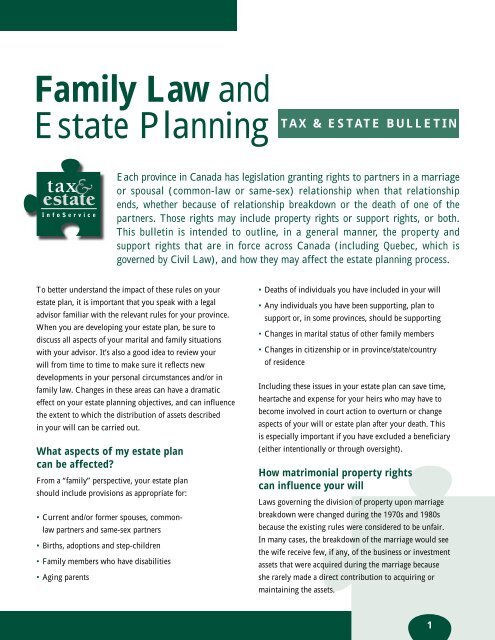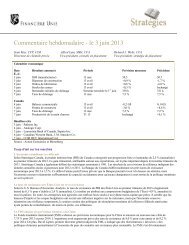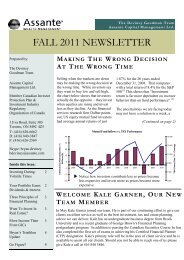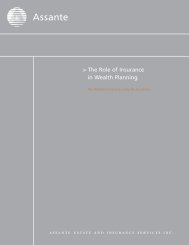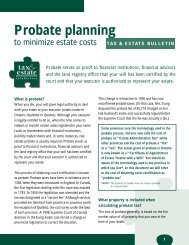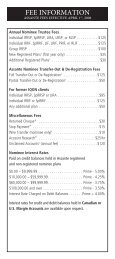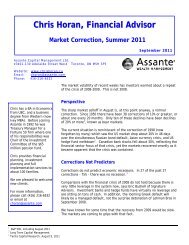Family Law & Estate Planning - Assante Wealth Management
Family Law & Estate Planning - Assante Wealth Management
Family Law & Estate Planning - Assante Wealth Management
Create successful ePaper yourself
Turn your PDF publications into a flip-book with our unique Google optimized e-Paper software.
<strong>Family</strong> <strong>Law</strong> and<br />
<strong>Estate</strong> <strong>Planning</strong><br />
TAX & ESTATE BULLETIN<br />
Each province in Canada has legislation granting rights to partners in a marriage<br />
or spousal (common-law or same-sex) relationship when that relationship<br />
ends, whether because of relationship breakdown or the death of one of the<br />
partners. Those rights may include property rights or support rights, or both.<br />
This bulletin is intended to outline, in a general manner, the property and<br />
support rights that are in force across Canada (including Quebec, which is<br />
governed by Civil <strong>Law</strong>), and how they may affect the estate planning process.<br />
To better understand the impact of these rules on your<br />
estate plan, it is important that you speak with a legal<br />
advisor familiar with the relevant rules for your province.<br />
When you are developing your estate plan, be sure to<br />
discuss all aspects of your marital and family situations<br />
with your advisor. It’s also a good idea to review your<br />
will from time to time to make sure it reflects new<br />
developments in your personal circumstances and/or in<br />
family law. Changes in these areas can have a dramatic<br />
effect on your estate planning objectives, and can influence<br />
the extent to which the distribution of assets described<br />
in your will can be carried out.<br />
What aspects of my estate plan<br />
can be affected?<br />
From a “family” perspective, your estate plan<br />
should include provisions as appropriate for:<br />
• Current and/or former spouses, commonlaw<br />
partners and same-sex partners<br />
• Births, adoptions and step-children<br />
• <strong>Family</strong> members who have disabilities<br />
• Aging parents<br />
• Deaths of individuals you have included in your will<br />
• Any individuals you have been supporting, plan to<br />
support or, in some provinces, should be supporting<br />
• Changes in marital status of other family members<br />
• Changes in citizenship or in province/state/country<br />
of residence<br />
Including these issues in your estate plan can save time,<br />
heartache and expense for your heirs who may have to<br />
become involved in court action to overturn or change<br />
aspects of your will or estate plan after your death. This<br />
is especially important if you have excluded a beneficiary<br />
(either intentionally or through oversight).<br />
How matrimonial property rights<br />
can influence your will<br />
<strong>Law</strong>s governing the division of property upon marriage<br />
breakdown were changed during the 1970s and 1980s<br />
because the existing rules were considered to be unfair.<br />
In many cases, the breakdown of the marriage would see<br />
the wife receive few, if any, of the business or investment<br />
assets that were acquired during the marriage because<br />
she rarely made a direct contribution to acquiring or<br />
maintaining the assets.<br />
1
Provincial family law legislation now provides some form<br />
of property sharing between the partners in a spousal<br />
relationship when that relationship breaks down. Some<br />
provinces have also given certain property rights to a<br />
surviving spouse on the death of the other spouse. If<br />
your spouse survives you, those property rights can<br />
override the instructions in your will.<br />
Matrimonial property rights from your beneficiaries’<br />
perspective must also be considered in your will. For<br />
example, if you intend to name your child as beneficiary<br />
of your estate, you should carefully consider how the<br />
applicable laws governing division of property between<br />
spouses deal with gifts or bequests received by one of the<br />
parties. This issue can be complicated by the fact that your<br />
child may change his or her place of residence from time<br />
to time. As an example, for the purpose of determining a<br />
spouse’s property claim in Ontario, the <strong>Family</strong> <strong>Law</strong> Act<br />
excludes from each spouse’s net worth calculation the<br />
value of gifts and inheritances (except the matrimonial<br />
home) received during marriage. You can put a clause<br />
in your will to similarly exclude income earned on the<br />
inheritance. If your will does not have a specific statement<br />
to this effect, then your beneficiary may not have all of<br />
the protection he or she needs. A lawyer can advise you<br />
of the rules in relation to inheritances for the various<br />
jurisdictions in which your beneficiaries are living and,<br />
where permitted, the wording in your will that is necessary<br />
to protect your beneficiaries.<br />
What is a “spouse” and why is it<br />
important to understand the definition?<br />
Many people are confused about the rights and obligations<br />
of parties to a relationship because the definition of spouse<br />
varies, depending on how and why you are using the term.<br />
For example, in 1993 the Income Tax Act was changed<br />
to allow identical treatment of a married spouse and a<br />
person who is, or has been, in an opposite-sex, conjugal<br />
relationship for at least 12 months.<br />
(This time period is reduced if the couple has a child<br />
together.) Recently, new legislation grants same-sex<br />
couples the same rights for income tax purposes as<br />
opposite-sex parties in a common-law relationship.<br />
The definition of spouse for income tax purposes is not<br />
exactly the same as the definition under provincial family<br />
law or succession (estate) law, although these laws<br />
generally are important for estate planning purposes<br />
relating to, for example, tax-deferred rollovers of RRSPs,<br />
RRIFs and capital property. You should be aware of some<br />
of the differences when it comes to determining the rights<br />
of the parties to a conjugal relationship as outlined in<br />
family law and succession law. Due to provincial differences<br />
in legislation and judicial decisions under the Canadian<br />
Charter of Rights and Freedoms, rights can vary dramatically<br />
from one province to another.<br />
For instance, in most provinces currently, only married<br />
spouses have rights to a share of the estate of a deceased<br />
spouse who dies without a will (called “intestate”). The<br />
married spouse is entitled to an amount set by the province<br />
(called a “preferential share”) and to a share of the balance<br />
of the estate as defined by the province (called a “distributive<br />
share”). The size of this distributive share depends on the<br />
number of surviving descendents (children, grandchildren,<br />
etc.) if any. In early 2000, British Columbia revised its<br />
succession laws to give all surviving partners the same<br />
rights in all aspects of intestacies, including the preferential<br />
share. This may become an issue in all provinces.<br />
Another example of the differences in rights for married<br />
spouses is who is allowed possession of the matrimonial<br />
home. “Possessory rights” include the right to live in the<br />
home or to block a sale of, or loan on the property. Many<br />
provinces limit possessory rights to married spouses.<br />
2
However, recently a Nova Scotia court ruled that<br />
the matrimonial property law in that province was<br />
unconstitutional, on the grounds that it discriminates<br />
against parties in a heterosexual common-law relationship.<br />
<strong>Family</strong> law legislation has a bearing on issues such as<br />
the appointment of your spouse as executor, and the<br />
provision of assets to your spouse under your will.<br />
Whatever province you live in as a couple, and whether<br />
you are married or living common law, family law issues<br />
should be kept in mind when drafting your will. For<br />
clarity, you should consider having a marriage contract<br />
or cohabita-tion agreement. Talk to your legal advisor<br />
to make sure you understand the matrimonial property<br />
rules in your province.<br />
Provincial rules for family property<br />
Each province refers to property included in marriage<br />
differently (“community property,” “family property,”<br />
“family patrimony,” “marital property” or “net family<br />
property,” to name a few). In this bulletin we will use<br />
the term “family property.” The provinces vary as to<br />
what actually makes up family property, but in most<br />
provinces the definition of family property is similar.<br />
Generally, legislation is based on the idea that marriage<br />
(or, in some cases, a common-law relationship) creates<br />
an economic partnership, and when that partnership<br />
breaks down, each partner is entitled to a share of<br />
the family property. That share is usually 50 per cent,<br />
although most provinces permit changes to that<br />
percentage under certain circumstances.<br />
CHANGES IN YOUR MARITAL STATUS CAN AFFECT<br />
YOUR WILL<br />
Unless drawn up in anticipation of a marriage, your<br />
pre-marriage will is automatically revoked by the<br />
marriage (not applicable in Quebec). This rule was<br />
made to ensure that your new relationship is taken<br />
into consideration in your estate plan. There can be<br />
times however, when there is a domestic contract in<br />
place that benefits the new spouse satisfactorily, and<br />
the terms of the pre-marriage will are acceptable to<br />
everyone concerned. Under these circumstances, the<br />
provinces of Ontario, Nova Scotia and New Brunswick<br />
permit a surviving spouse to file an election within<br />
one year of death to use a will made prior to the<br />
marriage. If no election is made, then the will is<br />
revoked. This could mean that other beneficiaries<br />
may be treated differently from the way you intended<br />
in your will. If however, you were previously married,<br />
and are now in a common-law relationship, your<br />
will may not be automatically revoked. Under these<br />
circumstances, it’s important that you draw a new<br />
will to reflect your new personal circumstances.<br />
If you are in a marital relationship at the time of your<br />
death and your spouse or partner is entitled to make a<br />
claim under family law, and does so, it can have a major<br />
impact on your estate plan. If part or all of the assets have<br />
to be sold to pay the claim, there may be no way to take<br />
advantage of a rollover to defer taxes. This could reduce<br />
the size of your estate that is remaining to distribute to<br />
your other beneficiaries.<br />
Matrimonial property rules can generally be overridden<br />
if both parties sign a domestic contract that clearly defines<br />
the division of property. Don’t rely on informal contracts,<br />
whether oral or written, because provincial laws have<br />
established minimum criteria to make domestic contracts<br />
legally enforceable, and informal agreements might not<br />
satisfy the provincial standards. To fully understand the<br />
family law issues that might affect you or an intended<br />
beneficiary, talk to your legal advisor.<br />
3
HOW DOES IT WORK UNDER QUEBEC CIVIL CODE?<br />
Regardless of which spouse is the registered owner<br />
of family assets, the principal and vacation homes<br />
of the family, furniture used by the family in the<br />
homes, motor vehicles used by the family, and<br />
retirement plan benefits accumulated during<br />
marriage form the family property that is divisible<br />
upon death. This is called the family patrimony.<br />
Shares held in private or public companies, bank<br />
accounts and term deposits do not form part of<br />
the family patrimony.<br />
Upon your death, the net value of all assets (market<br />
value less costs to acquire, improve or maintain)<br />
is roughly divided in half. Your surviving spouse is<br />
entitled to one-half of the family patrimony, even<br />
if your will says otherwise (e.g. totally excludes<br />
your spouse or bequeaths the entire value of the<br />
family patrimony to that spouse). The claim of<br />
your surviving spouse has priority over any of<br />
your other beneficiaries or heirs and this could<br />
reduce the amount of their inheritances.<br />
Division of inherited assets –<br />
what you should know<br />
If you are planning your will, or if you are the beneficiary<br />
under the will of someone else, it’s important that you<br />
understand how matrimonial property laws treat<br />
inheritances. Provincial variations in the laws can include:<br />
• Whether or not timing, (whether an inheritance is<br />
received either before or after the beginning of the<br />
conjugal relationship) is a deciding factor in sharing<br />
the inheritance<br />
• Whether or not the inheritance includes the<br />
matrimonial home<br />
• The extent to which other assets acquired with<br />
the proceeds of the inheritance must be shared<br />
• Whether or not the matrimonial property rules divide<br />
or exclude the assets or only the value of those assets<br />
• Whether or not the increase in value of the inheritance<br />
from the time of receipt until the end of the relationship<br />
must be divided<br />
Don’t forget support of dependants<br />
Since 1900, there has been dependant’s relief legislation in<br />
place that permits your dependants to ask for support from<br />
your estate. Provinces vary on the definition of dependant,<br />
so talk to your lawyer to make sure you are clear about this<br />
point. Ontario’s Succession <strong>Law</strong> Reform Act, for example,<br />
sets out a clear definition of a dependant, including a<br />
married spouse, common-law or same-sex partner who<br />
lived with you in a conjugal relationship for at least three<br />
years (or for less than that time if you and your partner<br />
together are the natural or adoptive parents of a child).<br />
Dependant’s relief legislation is intended to prevent a person<br />
from having to claim public assistance as a result of your<br />
death if you were, or should have been, supporting him or<br />
her at the time of death. Because of this, some provinces<br />
have legislation that makes certain assets available to satisfy<br />
a dependant’s relief claim, even if those assets would not<br />
otherwise form part of your estate. In Ontario, for example,<br />
a life insurance policy on which there is a designated<br />
beneficiary does not usually form part of your estate and<br />
is so protected from creditors. However, if there is a claim<br />
for dependant’s relief, the province’s Succession <strong>Law</strong> Reform<br />
Act expressly includes insurance proceeds of an individual<br />
insurance policy owned by you or a group insurance policy<br />
of which you were a member as part of your estate. RRSP<br />
and RRIF accounts owned by you may also be included for<br />
dependant’s relief claims, even if you have named a<br />
beneficiary on the plans.<br />
4
CASE: KAWIUK VS. WAGENKO ESTATE<br />
In a case decided in Manitoba in 1999, Mrs. Kawiuk<br />
had lived with John Wagenko for approximately<br />
11 years in a common-law relationship, until<br />
Mr. Wagenko’s death. It was agreed when she<br />
moved in with Mr. Wagenko that she would sell<br />
her own house and give the proceeds from the<br />
sale of her home to her two sons, as had been<br />
requested by her late husband.<br />
At the time of Mr. Wagenko’s death Mrs. Kawiuk<br />
had her own source of income, but was dependent<br />
on Mr. Wagenko for shelter. Unfortunately,<br />
Mr. Wagenko did not make any provision for her<br />
in his will. The court decided that the estate, given<br />
its nature and size, could provide reasonable support<br />
for Mrs. Kawiak, and so awarded her a lump-sum<br />
amount equal to the approximate value of the<br />
house she had previously sold.<br />
What can I do to make sure my<br />
will is followed when I die?<br />
Although your will outlines how you want your assets<br />
distributed at death, it cannot override your partner’s<br />
legal property or support rights that arise at your death.<br />
A domestic contract can outline how your assets are to be<br />
divided if the relationship between you and your spouse<br />
or partner ends. In some provinces however, a dependant’s<br />
relief claim cannot be overridden by a contract. A domestic<br />
contract is especially important for common-law and samesex<br />
relationships, as it clearly defines the rules and can<br />
reduce challenges from relatives who may not approve<br />
of the relationship. You should discuss this issue with<br />
your lawyer to clarify the rules in your province.<br />
Getting advice<br />
Talk to your advisor about how to make sure your estate<br />
plan includes all of the legal and personal considerations<br />
that affect you and your family. For more information<br />
on tax and estate issues, ask for copies of the Tax & <strong>Estate</strong><br />
Bulletins entitled Death & Taxes, Structuring an Effective<br />
Will and Incapacity – <strong>Planning</strong> Ahead Helps.<br />
Have a tax or estate planning question?<br />
Call us at 1.800.874.6275 or<br />
E-mail infoservice@aimfunds.ca<br />
The information contained in this bulletin is meant to be for education purposes only, and is not intended to offer<br />
legal advice. Talk to a lawyer familiar with family and estate law in your province for further clarification and advice.<br />
Commissions, trailing commissions, management fees and expenses all may be associated with mutual fund<br />
investments. Mutual funds are not guaranteed, their values change frequently and past performance may not be<br />
repeated. Please read the prospectus before investing. Copies are available from your financial advisor or from AIM<br />
Funds <strong>Management</strong> Inc.<br />
5
AIM Funds <strong>Management</strong> Inc.<br />
5140 Yonge Street, Suite 900<br />
Toronto, Ontario M2N 6X7<br />
Telephone:<br />
416.590.9855 or 1.800.874.6275<br />
Facsimile:<br />
416.590.9868 or 1.800.631.7008<br />
infoservice@aimfunds.ca<br />
www.aimfunds.ca<br />
Sales Offices<br />
Calgary<br />
Montreal<br />
Toronto<br />
Vancouver<br />
This Tax & <strong>Estate</strong> Bulletin has been prepared with the assistance of<br />
TBFLEPE(08/00)


